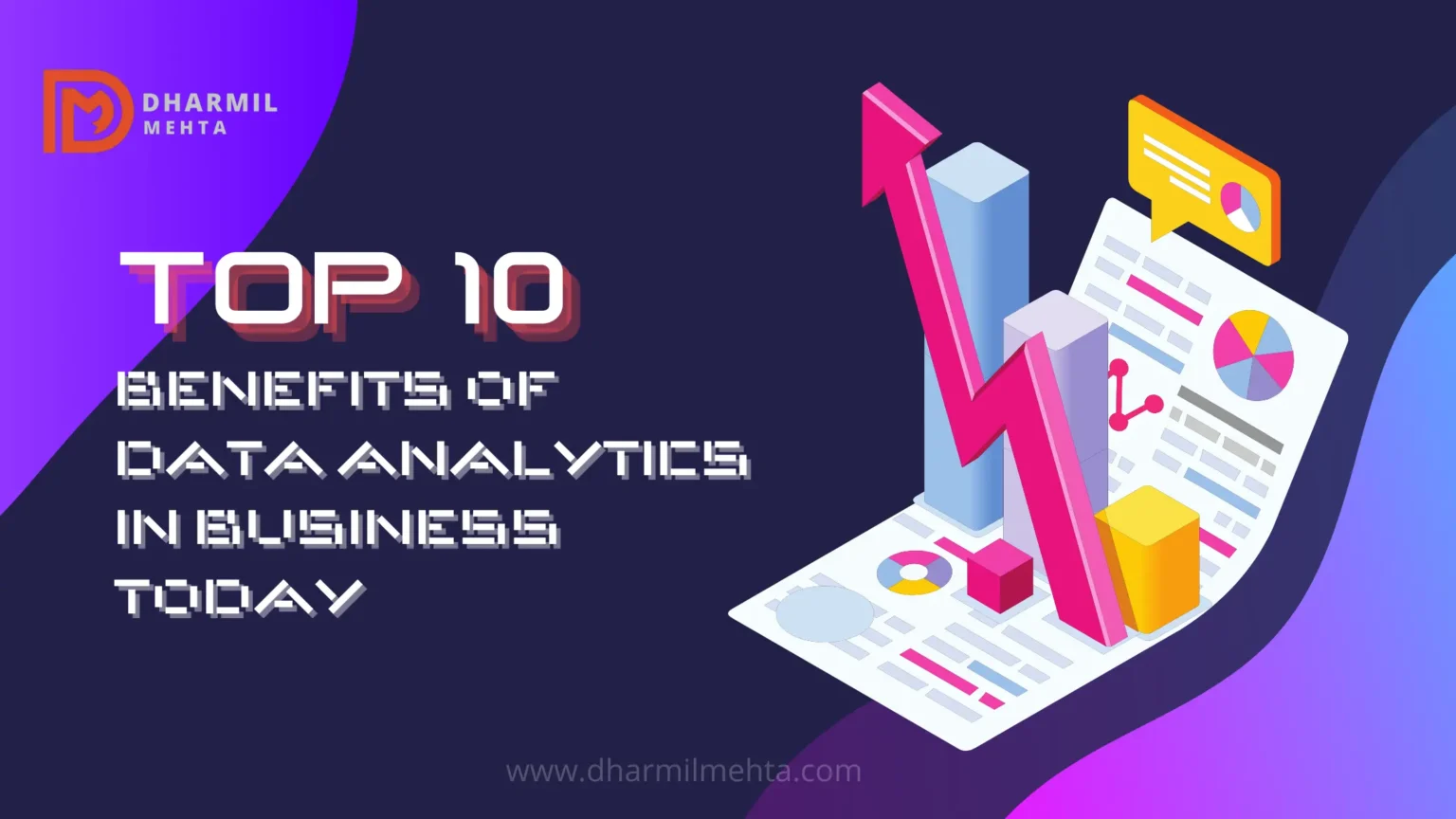In the modern business landscape, the transformative power of data analytics cannot be overstated. Data analytics has emerged as a crucial tool for businesses aiming to harness data to drive decision-making and gain a competitive edge. This article delves into the top 10 benefits of data analytics in business today, highlighting why it is vital, how it enhances performance, and its role in driving growth and innovation.

What is Data Analytics and Why It Matters Today
Data analytics involves examining raw data with the aim of uncovering patterns, correlations, and insights that can inform business strategies. This process uses statistical, mathematical, and computational techniques to turn data into actionable intelligence. The significance of data analytics in modern business lies in its ability to provide a data-driven approach to decision-making, enhancing accuracy and efficiency.
Overview of the Benefits of Data Analytics in Business
The benefits of using data analytics in business are manifold. From improving performance and decision-making to driving growth and optimizing operations, data analytics offers a range of advantages that can revolutionize how businesses operate. In this article, we will explore these benefits in detail, demonstrating how data analytics can be a game-changer for organizations of all sizes.
Grasping the Importance of Data Analytics for Business
Why Data Analytics is Important for Business Success
Understanding why data analytics is important for business success is fundamental. Data analytics enables businesses to make informed decisions based on concrete evidence rather than intuition alone. This analytical approach reduces uncertainty and allows for more strategic planning and forecasting.
The Importance of Data Analytics in Today’s Business World
Data analytics plays a pivotal role in the current business environment. It empowers companies to leverage their data assets effectively, leading to enhanced decision-making and operational efficiencies. Business intelligence and predictive analytics are integral to understanding market trends and customer behaviors, making data analytics indispensable for modern enterprises.
Boosting Business Performance
How Data Analytics Improves Business Performance
One of the primary benefits of data analytics is its ability to improve business performance. By analyzing key performance indicators (KPIs) and other relevant data, businesses can identify inefficiencies, optimize processes, and enhance overall performance. Advanced analytics techniques, such as predictive analytics, help forecast future trends and inform strategic decisions.
Data Analytics Techniques for Business Optimization
Several data analytics techniques are employed to optimize business operations. These include descriptive analytics, which provides insights into past performance, and prescriptive analytics, which offers recommendations for future actions. Implementing these techniques enables businesses to streamline operations and enhance efficiency.
Enhancing Business Decision Making
Data Analytics’ Impact on Strategic Business Decisions
Data analytics is essential for informed business decision-making. By providing insights into various aspects of the business, from customer preferences to market conditions, data analytics supports more informed and strategic decisions. This approach leads to better outcomes and reduces the risks associated with decision-making.
How Data Analytics Influences Business Decisions
How data analytics influences business decisions is evident in its ability to provide actionable insights. By analyzing data, businesses can uncover trends, patterns, and correlations that inform their strategies. This data-driven approach helps in making decisions that are aligned with business objectives and market demands.
Driving Business Growth
Data Analytics for Business Growth Strategies
Data analytics for business growth strategies involves using data insights to develop and implement strategies that drive expansion and profitability. By analyzing market trends and customer behavior, businesses can identify opportunities for growth and tailor their strategies accordingly.
Real-Life Examples of Data Analytics in Business
Real-life examples of data analytics in business illustrate its effectiveness in driving growth. Companies across various industries have successfully leveraged data analytics to enhance their operations, optimize marketing efforts, and improve customer experiences. These examples provide valuable lessons for other businesses looking to harness the power of data.
Optimizing Business Operations
Impact of Data Analytics on Business Operations
The impact of data analytics on business operations is profound. Data analytics helps businesses identify inefficiencies, streamline processes, and enhance overall operational effectiveness. By leveraging big data analytics and business intelligence, companies can make informed decisions that drive operational improvements.
Data Analytics for Business Process Optimization
Data analytics for business process optimization involves analyzing data to identify areas for improvement in business processes. By implementing data-driven changes, businesses can enhance efficiency, reduce costs, and improve overall performance.
Marketing and Customer Insights
Importance of Data Analytics in Marketing
The significance of utilizing data analytics in marketing is immense. Data analytics provides insights into customer behaviors, preferences, and market trends, enabling businesses to tailor their marketing strategies and campaigns more effectively. Marketing analytics helps in understanding the ROI of marketing efforts and optimizing future strategies.
Data Analytics for Customer Behavior Analysis
Data analytics for customer behavior analysis involves examining customer data to understand purchasing patterns, preferences, and behaviors. This information helps businesses develop targeted marketing strategies, improve customer experiences, and drive engagement.
Data Analytics for Improving Customer Satisfaction
Data analytics for improving customer satisfaction focuses on analyzing customer feedback, service interactions, and other relevant data to enhance the overall customer experience. By identifying areas for improvement and implementing data-driven changes, businesses can increase customer satisfaction and loyalty.
Strategic Advantages
Data Analytics for Competitive Business Advantage
Data analytics for competitive business advantage involves leveraging data to gain insights that provide a strategic edge over competitors. By analyzing market trends, customer behaviors, and operational data, businesses can identify opportunities and threats, enabling them to make more informed strategic decisions.
Integrating Data Analytics into Business Strategy
Integrating data analytics into business strategy involves incorporating data-driven insights into the strategic planning process. This integration helps businesses align their strategies with market conditions and customer needs, leading to more effective and targeted business plans.
Financial Insights and Risk Reduction
Data Analytics for Financial Business Insights
Data analytics for financial business insights provides valuable information on financial performance, budgeting, and forecasting. By analyzing financial data, businesses can make informed decisions regarding investments, cost management, and financial planning.
Data Analytics for Reducing Business Risks
Data analytics for reducing business risks involves using data to identify potential risks and mitigate them effectively. By analyzing historical data and risk factors, businesses can implement strategies to minimize risks and enhance overall risk management.
Innovation and Future Trends
Leveraging Data Analytics for Business Innovation
Leveraging data analytics for business innovation involves using data to drive creative solutions and new business models. By analyzing data, businesses can identify trends and opportunities for innovation, leading to the development of new products, services, and processes.
The Future of Data Analytics in Business
The future of data analytics in business is marked by advancements in technology and methodology. Emerging trends such as advanced analytics, artificial intelligence, and machine learning are set to further enhance the capabilities and applications of data analytics in the business world.
Productivity and Efficiency
Data Analytics for Enhancing Business Productivity
Data analytics for enhancing business productivity focuses on using data to improve efficiency and effectiveness in business operations. By analyzing performance metrics and operational data, businesses can identify areas for improvement and implement strategies to boost productivity.
Data Analytics for Operational Efficiency
Data analytics for operational efficiency involves using data to streamline business processes and reduce operational costs. By leveraging insights from data analysis, businesses can enhance their operational workflows and achieve greater efficiency.
Forecasting and Planning
Data Analytics for Better Business Forecasting
Data analytics for better business forecasting involves using data to predict future trends and outcomes. By analyzing historical data and market conditions, businesses can make more accurate forecasts and develop strategies that align with future expectations.
Data Analytics for Strategic Business Planning
Data analytics for strategic business planning helps businesses develop informed and data-driven plans. By incorporating data insights into the planning process, businesses can create strategies that are more aligned with market conditions and organizational goals.
E-commerce and Supply Chain
Importance of Data Analytics in E-commerce
Importance of data analytics in e-commerce lies in its ability to provide insights into customer behaviors, sales trends, and market dynamics. By analyzing e-commerce data, businesses can optimize their online strategies, improve customer experiences, and drive sales.
Data Analytics for Supply Chain Efficiency
Data analytics for supply chain efficiency involves using data to enhance the management of supply chain operations. By analyzing supply chain data, businesses can identify inefficiencies, optimize inventory management, and improve overall supply chain performance.
Tools and Practices
Data Analytics Tools for Improving Business Outcomes
Data analytics tools for improving business outcomes include a range of software and platforms designed to analyze and visualize data. These tools help businesses gain insights, make data-driven decisions, and track performance metrics effectively.
Best Data Analytics Practices for Business Leaders
Best data analytics practices for business leaders involve implementing strategies and methodologies that maximize the effectiveness of data analytics. These practices include setting clear objectives, investing in the right tools, and fostering a data-driven culture within the organization.
Case Studies and Success Stories
Data Analytics for Enhancing Sales Strategies
Data analytics for enhancing sales strategies involves using data to refine and optimize sales approaches. By analyzing sales data, businesses can identify trends, understand customer preferences, and develop targeted sales strategies.
Benefits of Predictive Analytics for Businesses
Benefits of predictive analytics for businesses include the ability to forecast future trends, anticipate customer needs, and make proactive decisions. Predictive analytics provides valuable insights that help businesses stay ahead of market changes and drive growth.
Compelling Case Studies in Practical Data Science Applications
Predictive Maintenance in Manufacturing
1. General Electric (GE)
General Electric, a renowned global industrial company, harnesses data science to implement predictive maintenance strategies. By analyzing sensor data from their industrial assets like jet engines and wind turbines, GE can anticipate maintenance needs before failures occur. This proactive maintenance approach reduces downtime and lowers maintenance expenses.
Data science has significantly enhanced GE’s manufacturing operations through predictive maintenance by:
- In their aviation sector, GE has reported a 30% reduction in unscheduled maintenance incidents by using predictive analytics on jet engine sensor data.
- In the renewable energy sector, data-driven maintenance practices have led to a 15% increase in operational efficiency for GE’s wind turbines.
- Over the past year, GE has saved $50 million in maintenance costs across various divisions due to predictive maintenance models.
2. Siemens
Siemens, another industrial powerhouse, adopts predictive maintenance through data science. They use machine learning algorithms to monitor and analyze data from their manufacturing machinery, allowing Siemens to identify patterns of wear and tear and schedule maintenance exactly when needed.
This approach has resulted in significant cost savings and improved operational efficiency for Siemens, including:
- A 20% reduction in unplanned downtime across their global manufacturing facilities since implementing data science-driven predictive maintenance solutions.
- A 15% increase in overall equipment effectiveness (OEE), enhancing production efficiency and lowering production costs.
- In a recent case study, Siemens documented an annual cost savings of $25 million in maintenance expenses, directly attributable to their data science-based predictive maintenance strategies.
The data for this case study was sourced from Turing.
Transforming Customer Experience with Data Analytics
In the competitive landscape of today’s business world, delivering an exceptional customer experience is paramount. Data analytics has become a vital tool in this pursuit, offering businesses the ability to gain profound insights into customer behavior, preferences, and needs. By harnessing the power of data analytics, companies can offer targeted advertisements, personalize customer interactions, and enhance e-commerce conversion rates. This analysis delves into how industry leaders like Netflix, Facebook, and Amazon have utilized data analytics to revolutionize customer experience through practical case studies. These examples highlight the tangible benefits of data-driven approaches, such as increased user engagement, improved advertising efficiency, and heightened customer satisfaction.
1. The Netflix Recommendation Engine: Personalized Content Delivery
Netflix, a premier streaming service, has revolutionized entertainment consumption with its personalized recommendation engine. By leveraging sophisticated algorithms to analyze user behavior, viewing history, and preferences, Netflix provides tailored content suggestions to millions of users globally. This case study explores how Netflix’s data analytics capabilities have enhanced customer satisfaction by boosting user engagement, extending viewing times, and transforming the overall customer experience.
2. Facebook’s Targeted Advertising: Precision in Marketing
Facebook, the social media giant, relies heavily on data analytics to drive its targeted advertising strategies. By analyzing user demographics, interests, and online behaviors, Facebook uses advanced data analytics tools to deliver personalized advertisements to its extensive user base. This case study examines how Facebook’s data analytics platform enables advertisers to effectively reach their desired audience, increasing click-through rates, conversion rates, and return on ad spend. It demonstrates the power of data analytics in optimizing marketing campaigns and delivering relevant content to users.
The data for this case study was sourced from 360digitmg.
3. Amazon’s Data-Driven E-commerce Enhancements
Amazon, the global e-commerce leader, employs data analytics to optimize conversion rates and enhance its website’s performance. By analyzing user browsing behavior, purchase histories, and product preferences, Amazon utilizes data-driven techniques such as personalized product recommendations, dynamic pricing, and targeted promotions to improve the shopping experience. This case study investigates how Amazon’s data analytics initiatives have boosted customer loyalty, satisfaction, and sales, illustrating the impact of data analytics on e-commerce success and the future of online shopping.
These case studies collectively illustrate how data analytics can significantly enhance the customer experience. By leveraging data-driven insights, organizations can deliver personalized experiences, optimize marketing efforts, and improve conversion rates, ultimately driving business growth and success.
Conclusion
Recap of the Top Benefits of Data Analytics in Business Today
The top benefits of data analytics in business today encompass improved performance, enhanced decision-making, and strategic growth. By leveraging data, businesses can gain a competitive edge, optimize operations, and drive innovation.
How to Implement Data Analytics in Your Business for Success
How to implement data analytics in your business for success involves integrating data-driven strategies into your operations. Start by investing in the right tools, developing a data-driven culture, and continuously analyzing and refining your data practices to achieve optimal results.
What are the primary benefits of data analytics in business?
Benefits of data analytics in business include improved decision-making, enhanced operational efficiency, increased customer satisfaction, better marketing strategies, and significant cost savings. By leveraging business intelligence and predictive analytics, businesses can gain actionable insights that drive growth and competitive advantage.
How does data analytics improve business performance?
Data analytics improves business performance by identifying inefficiencies, optimizing processes, and providing insights into key performance indicators (KPIs). Techniques such as descriptive analytics and predictive analytics help businesses forecast trends, streamline operations, and make data-driven decisions that enhance overall productivity.
Why is data analytics important for small businesses?
The importance of data analytics for small businesses lies in its ability to provide critical insights into customer behavior, market trends, and operational performance. By using data analytics tools, small businesses can make informed decisions, optimize their resources, and develop effective growth strategies that align with their business goals.
What role does data analytics play in business decision-making?
The role of data analytics in business decision-making is crucial. It helps businesses analyze large volumes of data to uncover patterns and trends that inform strategic decisions. By integrating data-driven decision-making into their processes, companies can reduce risks, identify opportunities, and improve their overall decision-making capabilities.
Can you provide examples of how data analytics has been used successfully in business?
Real-life examples of data analytics in business include companies like Amazon, which uses customer analytics to personalize shopping experiences, and Netflix, which leverages predictive analytics to recommend content. These examples demonstrate how data analytics can enhance customer satisfaction, drive sales, and provide a competitive edge in the market.
Additional Resources
Explore our comprehensive guides on the following topics:
- Digital Marketing Strategies for 2025
- Business Growth Tactics
- Latest Technology Innovations
- Essential Product Reviews and Information
- Effective Programmatic Advertising Strategies
These resources provide valuable information and actionable insights to help you stay ahead in the dynamic world of digital marketing and AI












